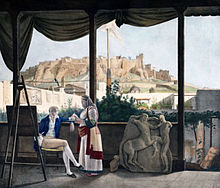Louis-François-Sébastien Fauvel

Louis-François-Sebastien Fauvel (born September 14, 1753 in Clermont-en-Beauvaisis and died March 12, 1838 in Smyrna) was a French painter, diplomat and archaeologist who was long stationed in Athens.[1] Fauvel has been called the "Father of Archeology in Greece."[2]
Biography[]
Louis-François-Sébastien Fauvel made his first stay in Greece in 1780-1782 in the service of the Comte de Choiseul-Gouffier.[3] His archaeological work was meant to complete the Comte's Voyage pittoresque de la Grèce. When the Count was appointed the ambassador of France to the Sublime Porte in 1784, he again engaged Fauvel.[1] The latter did not support the life of the embassy in the Ottoman capital and did many archaeological trips to collect the material for the future publications and the collection of antiques of his patron, through Greece or in the summer of 1789, Egypt. It was then that he expressed his tiredness of working for someone who did not recognize his qualities.
Fauvel settled permanently in Athens in the summer of 1793, after the emigration of Choiseul-Gouffier to Russia.[1] In February 1796, he ended up being recognized for his archaeological work and named "non-resident partner" of the Institut de France. This assured him of funding for the pursuit of his research. He succeeded, for example, in sending to the Louvre a metope and a section of the Parthenon frieze.
The Egyptian campaign entailed his imprisonment and his expulsion from the Ottoman Empire. He arrived in complete destitution in Paris in December 1801, sixteen years after leaving France.[1] He participated in the work of the Institute. Seeking to return to Greece, he obtained the post of Vice-Consul of France in Athens. He was back there in January 1803.[2] There he competed with Lord Elgin's agents,[4] including Giovanni Battista Lusieri, for the Parthenon marbles. Taking advantage of the reversal of the alliances, the French vice-consul managed to make the self-same agents search on his behalf. However, he could not carry out the archaeological work he was considering: he could not get away from Athens where his consular activities, however rare, held him back. Above all, he did not have the financial means to open large projects.
He then contented himself with limited research that he never published. In the same way, he sold the objects that he discovered, thus leaving the travellers who became the owners to publish their works on his discoveries. However, he played a key role in the development of archaeological knowledge of Athens and Attica by making the "cicerone" (guide) to the "tourists" who visited him.
During the Greek War of Independence Fauvel held anti-Hellenic sentiments. He fled the fighting and fled to Smyrna where he died.[1]
References[]
- ^ Jump up to: a b c d e Grummond, Nancy Thomson de (2015-05-11). Encyclopedia of the History of Classical Archaeology. Routledge. ISBN 9781134268610.
- ^ Jump up to: a b Hellmann, Marie-Christine; d'Athènes, École française; (France), École nationale supérieure des beaux-arts (1982). Paris--Rome--Athens: travels in Greece by French architects in the nineteenth and twentieth centuries. Museum of Fine Arts. ISBN 9780890900321.
- ^ Saunders, Nicholas J. (2007-07-30). Alexander's Tomb: The Two-Thousand Year Obsession to Find the Lost Conqueror. Basic Books. ISBN 9780465006212.
- ^ Pearce, Susan; Ormrod, Theresa (2017-06-16). Charles Robert Cockerell in the Mediterranean: Letters and Travels, 1810-1817. Boydell & Brewer. ISBN 9781783272068.
- 18th-century French painters
- French diplomats
- French archaeologists
- People from Oise
- 1753 births
- 1838 deaths
- 19th-century French painters